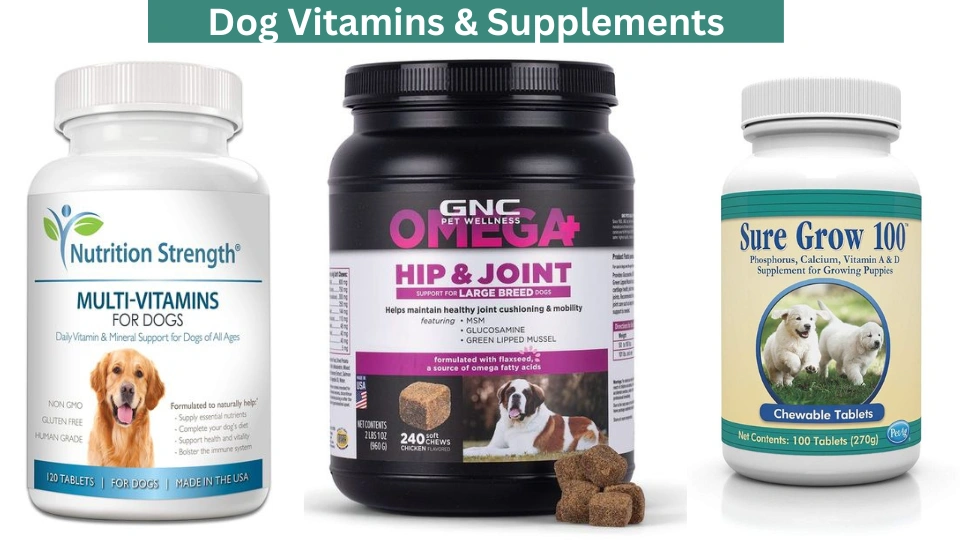Last Updated on March 7, 2024 by Aftab Tariq
Dog vitamins and supplements are essential for keeping our furry friends healthy. When we’re kids, our parents tell us to take vitamins to grow strong and healthy.

They might give us tasty gummies or hide vitamins in our food to make sure we get them. Even when we grow up, we might still take vitamins to stay healthy. But what about our pet dogs? Should they take vitamins too?
Well, most dogs can get everything they need from their food. Commercial dog food is specially made to give them all the right nutrients for a healthy life. It’s like having a well-balanced diet for dogs. This food provides them with all the optimal nutritional benefits they need.
But sometimes, vitamins and supplements can help support our dog’s health. Before giving your dog anything new, it’s best to ask the vet.
Are Vitamins or Supplements Necessary for Dogs?
Are you Providing your Dog With Vitamins or Supplements?
Did you know that many pet parents give their dogs extra vitamins and supplements? About 30% of them do it to help their dogs with different health problems like itchy skin, diarrhea, or joint pain.
But do dogs really need these extra things? And can just one dietary supplement sometimes cause problems instead of helping?
Let’s find out which dog vitamins and supplements are safe and actually work. And let’s learn how to make sure your dog gets everything they need to stay healthy.
Supplements 101 Dog Vitamins and Minerals
Dietary supplements are things you take by mouth to add extra nutrients to your body. According to the U.S. Food and Drug Administration (FDA), they can include vitamins, minerals, amino acids, herbs, or other things called ‘dietary ingredients’.

Botanicals are one example of these ingredients. For example, omega-3 fatty acids and glucosamine are dietary supplements that are not vitamins or minerals.
Vitamins and minerals are vital for dogs’ health and well-being. Unlike organic compounds such as protein or fat, they don’t provide energy directly. Instead, they play specific roles in various bodily functions, including growth, metabolism, and fighting off disease.
For instance, vitamins aid in growth and overall health maintenance, while also bolstering the immune system against illness. Similarly, minerals, although not composed of carbon like organic compounds, are essential for proper bodily function.
Good commercial dog foods recognize the significance of these nutrients, incorporating them to ensure a balanced diet. Just as humans might take a multivitamin for their health, dogs can obtain these crucial elements from their food.
Therefore, it’s essential to choose dog foods that provide the necessary vitamins, minerals, and other nutrients for optimal health and vitality.
“Good dog foods should have high-quality ingredients mixed with any needed supplements. This ensures they have all the vitamins and minerals that most healthy dogs need to thrive.”
I am a dedicated content writer with more than five years of experience, particularly skilled in the art of storytelling. My writing journey commenced during my college years, where I pursued journalism and unearthed my talent for creating captivating narratives.







